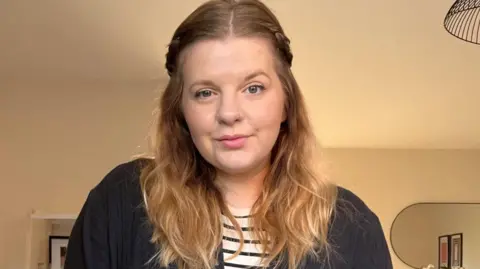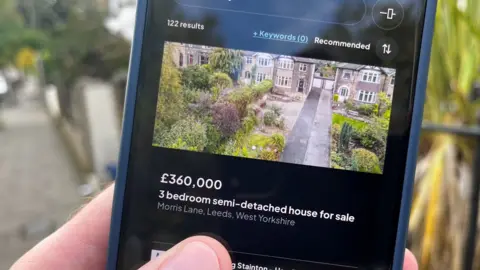 Katie Smith
Katie SmithKatie Smith has had an addiction for as long as she can remember. Something she feels compelled to do dozens of times a day.
The 30-year-old finds herself repeatedly opening the Rightmove app, despite the fact she has no intention of moving house anytime soon.
“Rightmove is my porn,” laughs Katie, from Stone, Staffordshire. “It’s like being a modern day peeping Tom,” she says, referring to the number of homes she looks inside, all from the comfort of her smartphone.
Last week, after a day trip to Knutsford, Cheshire, she spent the evening looking at all the houses for sale there – regardless of price. And during a recent weekend in London, she loved looking at “how expensive houses in Richmond are”, which was close to her hotel.
Property portals like Rightmove, Zoopla and On the Market are goldmines of user data about both homebuyers and sellers.
Zoopla told the BBC that 1,860 properties are viewed every minute on its website and app, while the figure is even higher for Rightmove – nearly 10,000 properties viewed per minute.
Rightmove recently rejected a fourth takeover bid by Rupert Murdoch’s REA Group, saying the latest £6.2bn offer undervalued the company and its future prospects, showing just how valuable the data it holds is.
The websites themselves acknowledge that not all their users may actually be looking to move home, so what is it that keeps people scrolling?
Katie, who previously worked in interior design, says she loves to check how quickly properties might sell and has a list of favourite homes she has looked at.
“I love character properties, things with features like beautiful Georgian homes,” she says.
While she and her partner are planning to move out of her rented accommodation in about six months, there is no immediate or urgent need to search.
“He thinks I am looking at more houses because of this, but it’s not – it’s just because I love it!”
‘I love a floorplan’
Sam Kennedy Christian, who lives in Herne Bay in Kent with her husband and two children, uses Zoopla to look at her dream purchases.
“I love imagining what I’d get if we won the lottery… specifically in the Isle of Man where I grew up and my family still live,” she says.
 Jessica Whitcher
Jessica Whitcher They moved closer to the seaside during the pandemic as many people looked for more outdoor space.
Sam says she enjoys refreshing the Zoopla app as part of her “bedtime scrolling” routine, or while waiting for the baby to drop off to sleep.
She also keeps an eye on similar properties in the local market, although they are not intending to sell anytime soon.
“I especially love a floorplan – you can get a real handle on a house, and how you might use the space.”
Dopamine trigger
When we browse property websites, we’re engaging in “a form of escapism that taps into the brain’s reward systems,” says Louisa Dunbar, the founder of OrangeGrove, a research agency that uses behavioural science to improve business websites.
“Visualising ourselves in these desirable homes triggers the dopamine system, giving us a sense of pleasure, even if we’re not planning to buy. It’s a chance to mentally step into a better life.”
She says that certain features of property portals can play a big role on what we might click on.
High-quality photos may encourage viewers to picture themselves living in a property, while the use of badging listings with terms like “Highlight” or “Just added” fuels the fear of missing out.
These psychological triggers can keep us engaged as we nose around the neighbour’s living room, or imagine a better future, she says.

Users may love these property sites, but are they worth it to estate agents, given most online viewings will not turn into actual enquiries?
Some agents have expressed unease at the high cost to advertise, particularly on Rightmove as the market leader. They say they provide all the photos and listings information about the houses for sale and are then having to pay to do it. It means these high costs can limit their ability to advertise in local newspapers or other places.
One estate agent, who did not wish to be named, told the BBC: “Right now, it’s a case of not being able to live without the likes of Rightmove. The prices [for estate agents] are going up faster than I’d like and I worry about the stranglehold they have on the market.
“But, even if many users are just idly browsing without any real intention of moving, it is still worth it to have properties on there.”
Rightmove responded, saying it has “a variety of different packages to suit businesses of different sizes and needs and the average [agent] spends £1,497 per month”.
Both Rightmove and Zoopla are bullish about the future, saying that confidence in the market is recovering as mortgage rates fall. On Thursday, Zoopla said the number of homes for sale on its platform is growing.
And for now they seem to be attracting everyone whether you’re an idle browser just nosing around, fantasising perhaps about castles you can never afford, a homeowner checking on how the value of your home compares with your neighbours’, or even an actual genuine buyer.
Additional reporting by Chris Newlands
